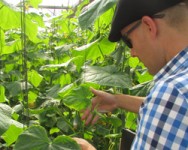Event Details
Date
January 2, 2020
Time
9:00 AM - 2:00 PM
Location
Finger Lakes Produce Auction
3691 NY-14A
Penn Yan, NY 14527
Cost
This event is free.
Host
Cornell Cooperative ExtensionJudson Reid
585-313-8912
email Judson Reid
2020 Finger Lakes Produce Auction Education Meeting
January 2, 2020
This meeting is our annual winter educational event for Finger Lakes Produce Auction growers. This year we will focus on farm food safety clarifications, soil health, pepper pests, strawberries, and control of tomato and vine crop diseases through use of biopesticides. 2.5 DEC recertification credits will be available in category 23, and 0.5 credits in category 22.
9:00 am-9:30 am Registration, pesticide credit roster sign-in
9:30 am-9:40 am Welcome and FLPA Market Update: Ray Hoover and Judson Reid, Cornell Cooperative Extension (CCE), Cornell Vegetable Program
9:40 am-10:00 am Food Safety Modernization Act talk- GAPs vs FSMA, who is covered: Caroline Boutard-Hunt, Cornell Cooperative Extension of Yates County
10:00 am-10:15 am Soil health in high tunnels to increase plant health and reduce disease, research update: Caitlin Vore, CCE Cornell Vegetable Program
10:15 am-10:45 am Soil health and cover crops for reducing pest pressure and increasing yield diversified plasticulture systems: Caitlin Vore and grower panel
10:45 am-11:30 am Pepper Pest Update- broad mites, aphids and European corn borer: Judson Reid
11:30 am-12:30 pm Lunch
12:30 pm-1:00 pm Strawberry pest update- tarnished plant bug, potato leaf hopper and strawberry leaf spot: Esther Kibbe, Berry Specialist, CCE Harvest New York
1:00 pm-1:30 pm Tomato diseases and control with bio-pesticides: Steve Bogash, Penn State
1:30 pm-2:00 pm Vine crop diseases and control with bio-pesticides: Steve Bogash
Attendees interested in DEC Recertification Credits will be required to present an ID and record their certification ID number, print name and sign the Recertification Training Roster. The roster will be secured by a Cornell Vegetable Program representative and only the attendees who stay for the entire course will be awarded a certificate.



































